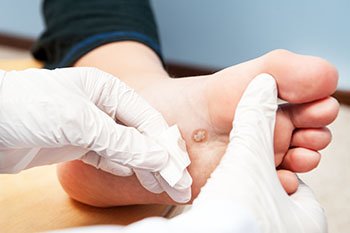
Plantar warts are small growths that appear on the soles of the feet, often caused by the human papillomavirus, or HPV. They typically develop in areas of pressure, such as the heels or balls of the feet, where the virus enters through small cuts or cracks in the skin. Symptoms include a rough, grainy texture on the bottom of the foot, pain or tenderness when walking, and tiny black dots in the wart, which are blood vessels. The wart may grow larger or multiply over time, if left untreated. A podiatrist can diagnose plantar warts through a physical exam and may remove a small sample for testing, if needed. Treatment options include topical medication, cryotherapy, or minor surgical removal. In some cases, mild treatments may also help, but professional care ensures the most effective and thorough removal. If you have a painful plantar wart, it is suggested that you schedule an appointment with a podiatrist for a proper diagnosis and appropriate treatment plan.
Plantar warts can be very uncomfortable. If you need your feet checked, contact one of our podiatrists from Lexington Foot and Ankle Center, PSC. Our doctors will assist you with all of your foot and ankle needs.
About Plantar Warts
Plantar warts are the result of HPV, or human papillomavirus, getting into open wounds on the feet. They are mostly found on the heels or balls of the feet.
While plantar warts are generally harmless, those experiencing excessive pain or those suffering from diabetes or a compromised immune system require immediate medical care. Plantar warts are easily diagnosed, usually through scraping off a bit of rough skin or by getting a biopsy.
Symptoms
- Lesions on the bottom of your feet, usually rough and grainy
- Hard or thick callused spots
- Wart seeds, which are small clotted blood vessels that look like little black spots
- Pain, discomfort, or tenderness of your feet when walking or standing
Treatment
- Freezing
- Electric tool removal
- Laser Treatment
- Topical Creams (prescription only)
- Over-the-counter medications
To help prevent developing plantar warts, avoid walking barefoot over abrasive surfaces that can cause cuts or wounds for HPV to get into. Avoiding direct contact with other warts, as well as not picking or rubbing existing warts, can help prevent the further spread of plantar warts. However, if you think you have developed plantar warts, speak to your podiatrist. He or she can diagnose the warts on your feet and recommend the appropriate treatment options.
If you have any questions please feel free to contact our offices located in Harrodsburg, Frankfort, Georgetown, and Lexington, KY . We offer the newest diagnostic and treatment technologies for all your foot and ankle needs.